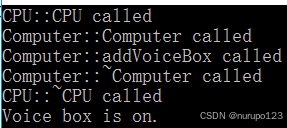静态成员函数
类的静态方法:
1.可以直接通过类来访问【更常用】,也可以通过对象(实例)来访问。
2.在类的静态方法中,不能访问普通数据成员和普通成员函数(对象的数据成员和成员函数)
1)静态数据成员
可以直接访问“静态数据成员”对象的成员函数(没有static的成员函数)内部,类的静态成员函数(有static的成员函数)内部,可以直接访问“静态数据成员”即:所有的成员函数,都可以访问静态数据成员。类不能直接访问普通的静态数据成员(Human::humanCount非法)
2)静态成员函数
对象可以直接访问静态成员函数
类可以直接访问静态成员函数(Human::getHumanCount())在类的静态成员函数(类的静态方法)内部,不能直接访问this指针和对象的数据成员!在类的静态成员函数(类的静态方法)内部,只能访问类的数据成员。
const数据成员
定义为const数据类型(常量数据成员)const数据成员的初始化方式
1.使用类内值(C++11支持)


我们猜一猜 类内初始值=2 然后再类外进行初始值定义 以哪个为准?
答案是报错,多次初始化

2.使用构造函数的初始化列表(如果同时使用这两种方式,以初始化列表中的值为最终初始化结果)
注意:不能在构造函数或其他成员函数内,对const成员赋值!


const static int count 可以类内赋值 ,但是去掉了const 就不可以了,得在类外赋值
组合和聚合
说明:组合和聚合,不是C++的语法要求,是应用中的常用手段
组合
构建一个计算机类,一台计算机,由CPU芯片,硬盘,内存等组成。
CPU 芯片也使用类来表示。
CPU.h
#pragma once
#include <string>
class CPU {
public:
CPU(const char* brand = "intel", const char* version = "i5-7500");
~CPU();
private:
std::string brand;
std::string version;
};CPU.cpp
#include "CPU.h"
#include <iostream>
CPU::CPU(const char* brand, const char* version) {
this->brand = brand;
this->version = version;
std::cout << __FUNCTION__ << " called" << std::endl;
}
CPU::~CPU() {
std::cout << __FUNCTION__ << " called" << std::endl;
}
Computer.h
#pragma once
#include "CPU.h"
class Computer {
public:
Computer(const char* cpuBrand , const char* cpuVersion , int harDisk , int memory);
~Computer();
private:
CPU cpu;
int hardDisk;
int memory;
};Computer.cpp
#include <iostream>
#include "Computer.h"
Computer::Computer(const char* cpuBrand, const char* cpuVersion, int hardDisk, int memory) : cpu(cpuBrand, cpuVersion) {
this->hardDisk = hardDisk;
this->memory = memory;
std::cout << __FUNCTION__ << " called" << std::endl;
}
Computer::~Computer() {
std::cout << __FUNCTION__ << " called" << std::endl;
}main.cpp
#include <iostream>
#include "Computer.h"
int main() {
Computer computer1("intel" , "i9" , 1000 , 8);
}
聚合
给计算机配备一台音响
Computer.h
#pragma once
#include "CPU.h"
class VoiceBox {
public:
VoiceBox() {}
~VoiceBox() {}
void VioceBoxOn() {
std::cout << "Voice box is on." << std::endl;
}
};
class Computer {
public:
Computer(const char* cpuBrand , const char* cpuVersion , int harDisk , int memory);
~Computer();
void addVoiceBox(VoiceBox* vb);
private:
CPU cpu;
int hardDisk;
int memory;
VoiceBox *voiceBox;
};Computer.cpp
#include <iostream>
#include "Computer.h"
Computer::Computer(const char* cpuBrand, const char* cpuVersion, int hardDisk, int memory) : cpu(cpuBrand, cpuVersion) {
this->hardDisk = hardDisk;
this->memory = memory;
std::cout << __FUNCTION__ << " called" << std::endl;
}
Computer::~Computer() {
std::cout << __FUNCTION__ << " called" << std::endl;
}
void Computer::addVoiceBox(VoiceBox* voiceBox) {
this->voiceBox = voiceBox;
std::cout << __FUNCTION__ << " called" << std::endl;
}main.cpp
#include <iostream>
#include "Computer.h"
int main() {
VoiceBox voicebox1;
{
Computer computer1("intel", "i9", 1000, 8);
computer1.addVoiceBox(&voicebox1);
}
voicebox1.VioceBoxOn();
}
可以看到Computer这个类不能左右VoiceBox的构造和析构。
聚合不是组成关系,被包含的对象,也可能被其他对象包含拥有者,不需要对被拥有的对象的生命周期负责。
项目-相亲系统
Girl.h
#pragma once
#include <iostream>
#include <string>
#include <vector>
class Boy;
class Girl {
public:
Girl();
Girl(std::string name, int age, int beauty);
~Girl();
int getAge() const;
std::string getName() const;
int getBeauty() const;
std::string Description() const;
bool satisfy(const Boy& boy) const;
static void inputsGirls(std::vector<Girl>& girls);
private:
std::string name;
int age;
int beauty;
};Boy.h
#pragma once
#include <string>
#include <vector>
class Girl;
class Boy {
Boy();
Boy(std::string name, int age, int beauty);
~Boy();
int getAge() const;
int getBeauty() const;
std::string Description() const;
bool satisfy(const Boy& other);
static void inputsBoys(std::vector<Boy>& boys);
private:
std::string name;
int age;
int beauty;
};Girl.cpp
#include "girl.h"
#include "boy.h"
#include <string>
#include <sstream>
#define YANZHI_FACTOR 1.1
Girl::Girl(){}
Girl::Girl(std::string name, int age, int beauty) {
this->name = name;
this->age = age;
this->beauty = beauty;
}
Girl::~Girl(){}
int Girl::getAge() const {
return age;
}
std::string Girl::getName() const {
return name;
}
int Girl::getBeauty() const {
return beauty;
}
std::string Girl::Description() const {
std::stringstream ss;
ss << name << "颜值" << beauty << " 年龄" << age;
return ss.str();
}
bool Girl::satisfy(const Boy& boy) const {
if(boy.getSalary() >= beauty * YANZHI_FACTOR) return true;
return false;
}
void Girl::inputsGirls(std::vector<Girl>& girls) {
int age;
std::string name;
int beauty;
int n = 1;
while (1) {
std::cout << "请输入第" << n << "位女孩的信息(输入0结束输入):" << std::endl;
std::cout << "年龄:" << std::endl;
std::cin >> age;
if (age == 0) break;
std::cout << "姓名:" << std::endl;
std::cin >> name;
std::cout << "颜值:" << std::endl;
std::cin >> beauty;
n++;
girls.push_back(Girl(name, age, beauty));
}
}Boy.cpp
#include <sstream>
#include <string>
#include "boy.h"
#include "girl.h"
#define SALARY_FACTOR 0.005
Boy::Boy(){}
Boy::Boy(std::string name, int age, int salary) {
this->name = name;
this->age = age;
this->salary = salary;
}
Boy::~Boy(){}
std::string Boy::getName() const {
return name;
}
int Boy::getAge() const {
return age;
}
int Boy::getSalary() const {
return salary;
}
std::string Boy::Description() const {
std::stringstream ss;
ss << "Name: " << name << ", Age: " << age << ", Salary: " << salary;
return ss.str();
}
void Boy::inputsBoys(std::vector<Boy>& boys) {
int n = 1;
std::string name;
int age;
int salary;
while (1) {
std::cout << "请输入第" << n << "位男孩的信息(输入0结束输入):" << std::endl;
std::cout << "年龄:" << std::endl;
std::cin >> age;
if (age == 0) break;
std::cout << "姓名:" << std::endl;
std::cin >> name;
std::cout << "工资:" << std::endl;
std::cin >> salary;
boys.push_back(Boy(name, age, salary));
n++;
}
}
bool Boy::satisfy(const Girl& girl) {
if (girl.getBeauty() >= salary * SALARY_FACTOR) {
return true;
}
else return false;
}
main.cpp
#include <string>
#include <iostream>
#include "boy.h"
#include "girl.h"
using namespace std;
void autoPair(vector<Boy>& boys, vector<Girl>& girls) {
for (Boy& b : boys) {
for (Girl& g : girls) {
if (b.satisfy(g) && g.satisfy(b)) {
cout << b.Description() << " and " << g.Description() << endl;
}
}
}
}
int main() {
vector<Boy> boys;
vector<Girl> girls;
Boy::inputsBoys(boys);
Girl::inputsGirls(girls);
cout << "pairs\n" << endl;
autoPair(boys, girls);
}